Travel is a unique way of bringing people together, opening hearts and minds, and revealing the shared humanity in unfamiliar places. But few people have shaped the way we explore the world as profoundly as Maureen and Tony Wheeler, co-founders of Lonely Planet. Hosted by the Wheeler Institute for Business and Development, opened by Sergei Guriev, Dean and Professor of Economics of London Business School, and moderated by Rajesh Chandy, Professor of Marketing at LBS, Tony and Maureen Wheeler Chair in Entrepreneurship and Co-Academic Director of the Wheeler Institute, we welcomed back Maureen (LBS Honorary Fellow 2011) and Tony Wheeler (LBS MSc05 1972) to London Business School, who shared their remarkable story, discussed their entrepreneurial path, the birth of Lonely Planet, and their ongoing legacy in global development.
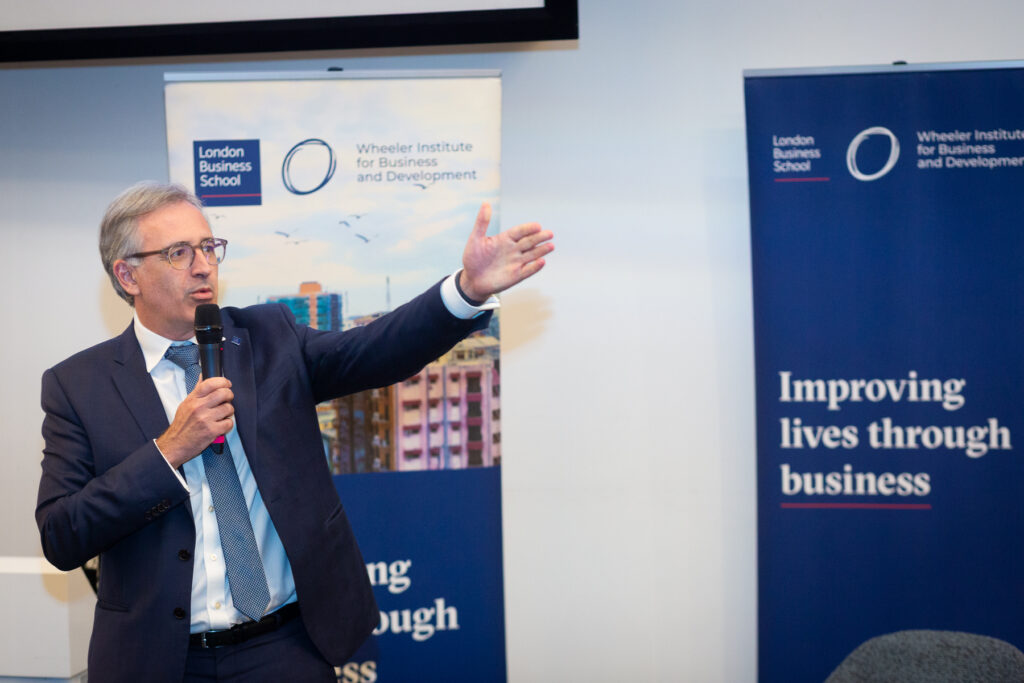
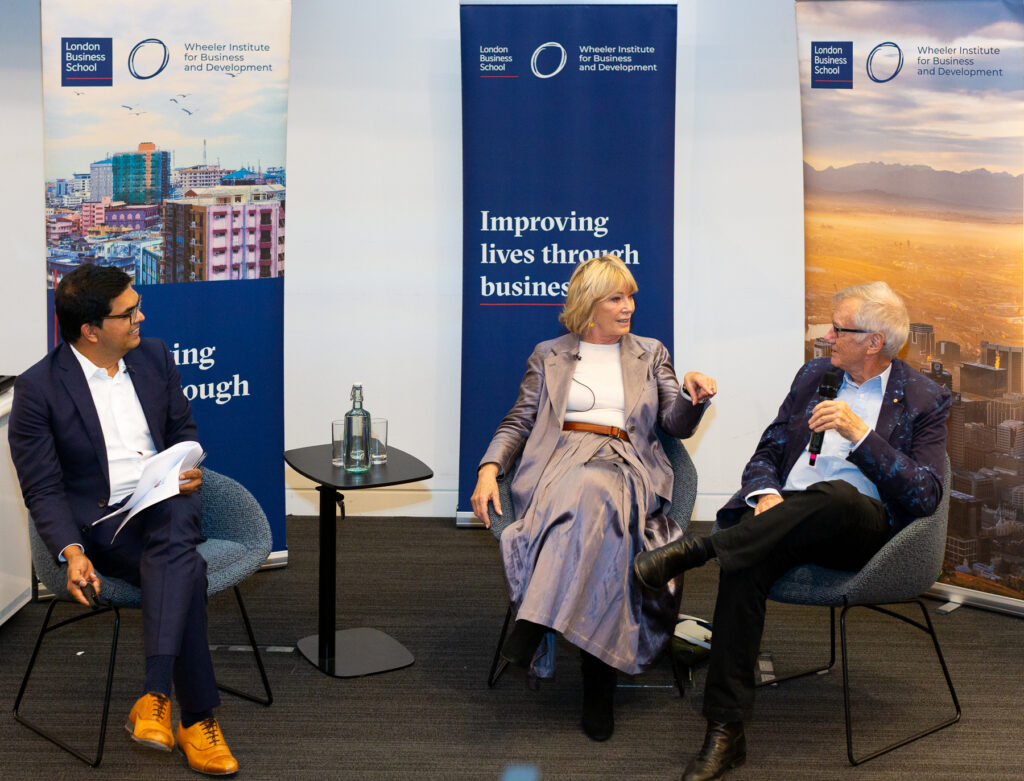
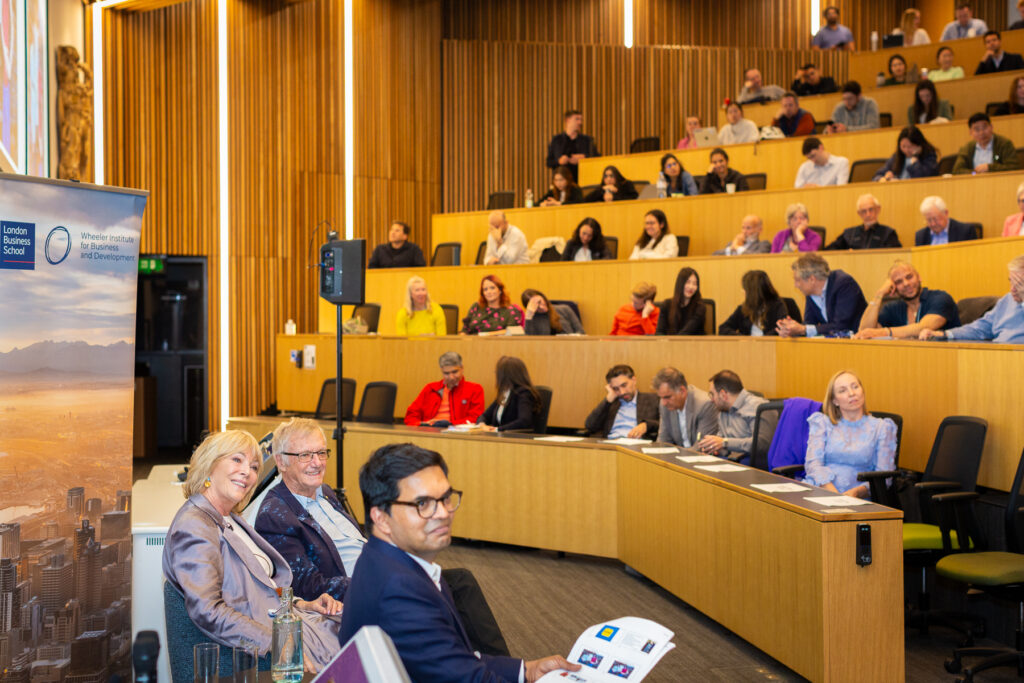
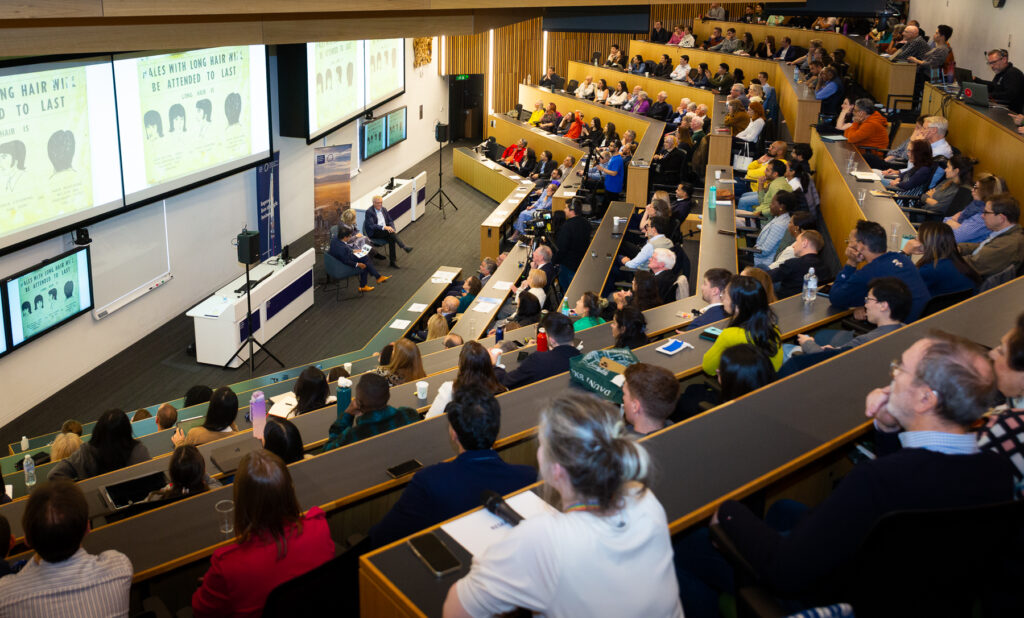
From Park Benches to the Hippie Trail
It all began on a park bench in Regent’s Park in 1971, just across from London Business School’s Sussex Place campus. Tony, then an LBS student, struck up a conversation with Maureen, an Irish backpacker who was reading Tolstoy. One year later to the day, on 7 October 1972, they married and set off in a £65 second-hand minivan towards Afghanistan with a dream of travelling the world.
Their route, part of the now-famous “Hippie Trail,” across Iran, India, Nepal, and Southeast Asia, was not always glamorous. Maureen recounted moments of charm and challenge, from fixing the near-broken minivan in a snowy day and making a £5 profit selling it off in Afghanistan, to surviving 16 days at sea on a concrete yacht running low on food, water, and fuel. “The only food left was tinned asparagus, creamed corn, and Christmas pudding,” she said, laughing.
But those early experiences planted a seed: With curiosity to explore and resilience to deal with unpredictability, anyone could experience the richness of the diverse cultures and scenery the world has to offering.
The Birth of a Global Travel Phenomenon
Upon reaching Sydney with little savings left, the couple found themselves repeatedly answering the same questions from fellow travellers: “How did you do it? Where did you go? How much did it cost?” Tony’s experience editing a university newspaper and Maureen’s practical ingenuity sparked the idea to write a guidebook.
Their first book, Across Asia on the Cheap, was a 96-page guide written on borrowed typewriters, hand-cut with a guillotine, and stapled together in the evenings—then sold to local bookstores. This self-published, do-it-yourself effort quickly gained momentum. A feature in a local newspaper led to television coverage and growing public interest. Soon, demand surged.
That modest booklet marked the birth of Lonely Planet, a brand that would sell over 150 million books and shape the journeys of millions of travellers across the globe.
Scaling the Dream
From the outset, Lonely Planet was deeply entrepreneurial. “We were the writers, editors, publishers, marketers, and sales team,” Maureen noted. A defining moment came in 1977, when the couple spent months researching and producing the guide to India—an ambitious 1,000-page publication that sold over 100,000 copies and catapulted Lonely Planet into a new phase of growth.
Their strategy wasn’t guided by boardrooms or business plans, but by empathy and experience. They were producing books they themselves would want to use. As Tony said, “We had done it, so we understood what travellers needed.”
They expanded rapidly, bringing on other writers and incorporating regional guides. At a time when major publishers dismissed travel as niche, Lonely Planet became the go-to source for independent, immersive exploration.
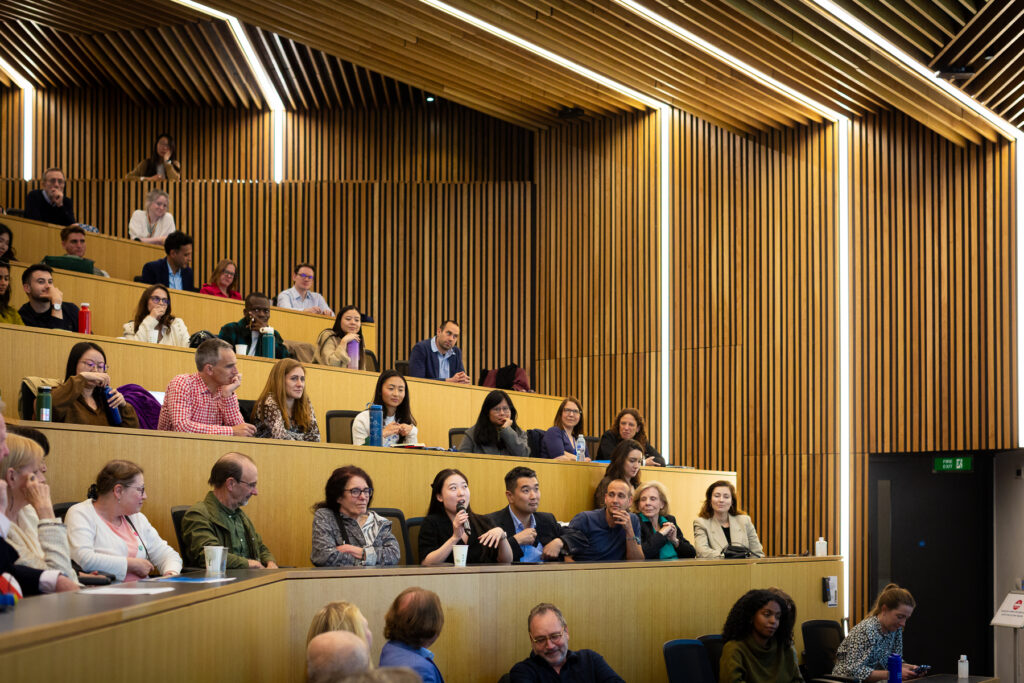
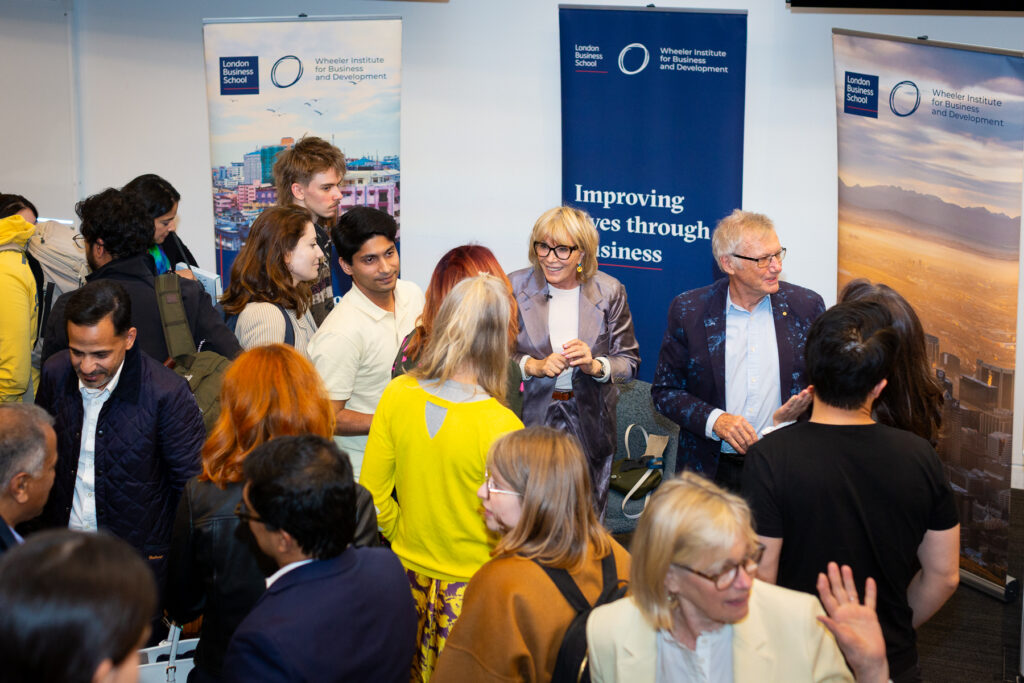
Changes and a New Chapter
Of course, the journey wasn’t always smooth. From navigating unanticipated shocks such as the dissolution of Soviet Union and the SARS pandemic in China, the Wheelers faced the challenges of adapting to changes while scaling the business. Maureen described how the couple partnered together as a team, “Tony was the architect, and I was the carpenter. He had the vision, and I made sure it worked.”
While they continued to scale and adapt the business, building pioneering online forums like Thorn Tree, venturing into early digital publishing with platforms like PalmPilot, the Wheeler recognised the right timing to let go. By 2007, the couple sold Lonely Planet to BBC, “Whatever you do, it has to be your love,” Tony said, understanding that the digital future of publishing required a new kind of leadership. “We could see the world changing, and we wanted to pursue new passions.”
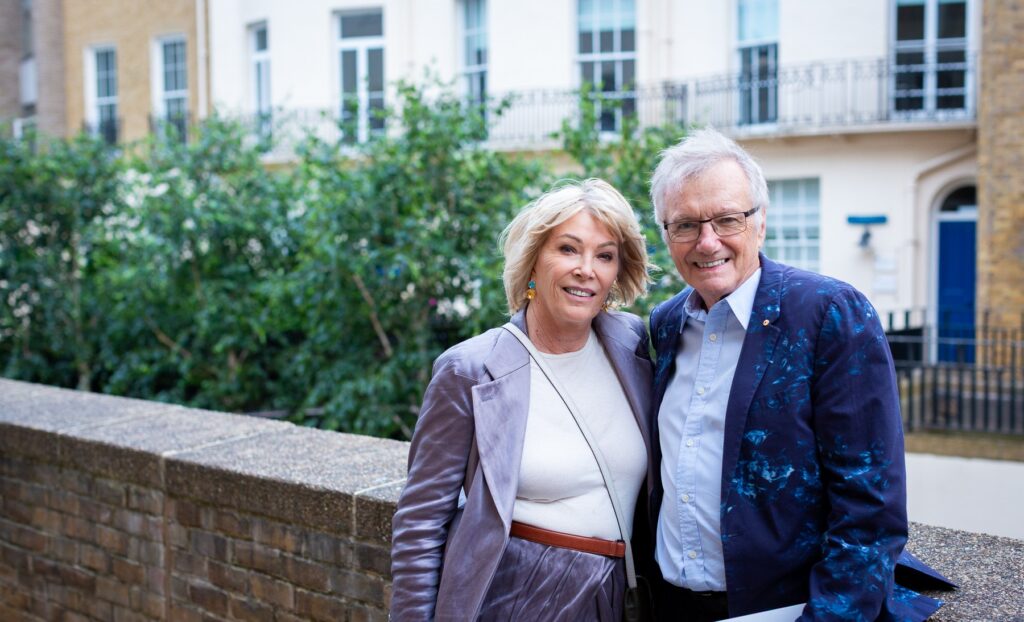
Impact Beyond Travel
Even before selling the business, the Wheelers had turned their attention toward philanthropy. In 1987, they launched the Lonely Planet Foundation (later renamed the Planet Wheeler Foundation), supporting grassroots projects in the same countries they wrote about. From education in Uganda to healthcare in South Asia, their philanthropic philosophy has always cantered on empowering those already doing meaningful work on the ground.
This spirit continues through the Wheeler Institute for Business and Development at London Business School, which builds on their passions, empowers doing good through business, applies rigorous research and education to tackle development challenges, particularly in emerging markets.
In a fast-changing world with tensions and conflicts, the Wheelers’ story is a reminder that meaningful journeys—whether across continents or across industries—are built on passion, persistence, and partnership. The Wheelers’ journey was a love story, a travel diary, a business case, and a masterclass in humility—all rolled into one. The legacy of Lonely Planet lives on not just in books, but in the hundreds of places and millions of lives it touched—and in the mission-driven work of the Institute at London Business School that proudly bears the Wheelers’ name.
Speakers
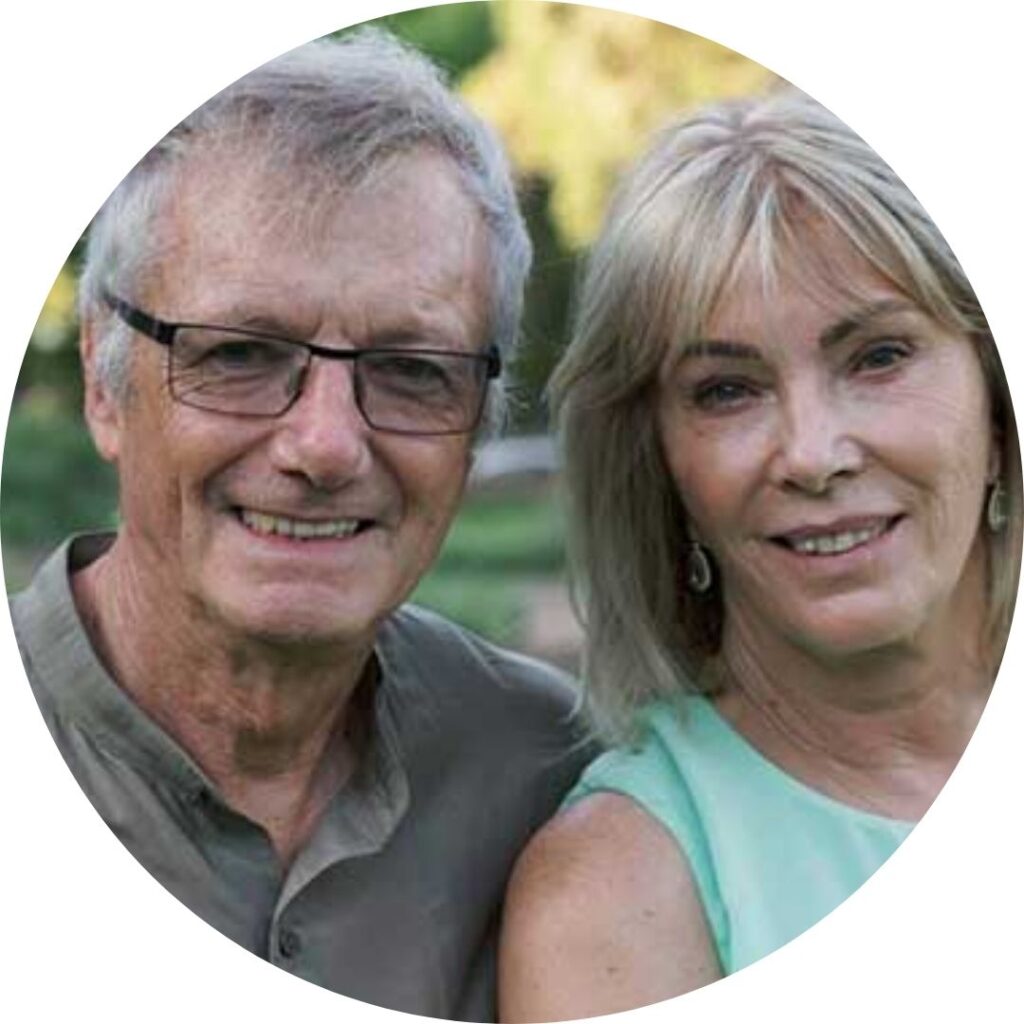
Tony and Maureen Wheeler
Tony and Maureen Wheeler are the co-founders of Lonely Planet, the world’s largest travel guidebook publisher. Their journey began in the early 1970s with a trip from London to Australia, which inspired their first guidebook, Across Asia on the Cheap. Over the next three decades, they built Lonely Planet into a globally recognized brand, known for its comprehensive and accessible travel content. In 2007, they sold the company to the BBC. Since then, Maureen and Tony have focused on philanthropic initiatives, supporting projects that leverage business solutions for development challenges. Tony Wheeler is an LBS alum, having completed a Master of Science in Management (as the MBA was then known) in 1972. In 2018, Maureen and Tony awarded a major donation to London Business School for the new Wheeler Institute for Business and Development.

Rajesh Chandy is Professor of Marketing and the Tony and Maureen Wheeler Chair in Entrepreneurship at London Business School, where he is also the Co-Academic Director of the Wheeler Institute for Business and Development. Rajesh’s current research lies at the intersection of business and development. His recent projects have covered the impact of business skills among micro-entrepreneurs in South Africa, novel financing approaches in Ghana, property rights in slums in Egypt, innovation among farmers in India, highways and private education expenditures in India, and using big data for development outcomes.
Rajesh is a member of the advisory board of the Journal of Marketing and a Co-Editor of the journal’s special issue on “Better Marketing for a Better World”. He is also co-editor of the Management Science special issue on “Business and Climate Change,” and previously served as an Area Editor for the Entrepreneurship and Innovation area at Management Science. His research and publications have received several awards, including the Mahajan Award for Lifetime Contributions to Marketing Strategy Research.
About the writer

Luise Lin is an MBA 2026 candidate at London Business School and an Outreach and Communication Intern at the Wheeler Institute for Business and Development. Prior to joining London Business School, she worked at Boston Consulting Group as Consultant in Australia, where she advised clients across private and public sectors as well as social enterprises. Luise is passionate about leveraging managerial science, innovative business models, and financial solutions to drive scalable economic development impact in developing regions. She is particularly interested in the intersections of management, policy and social impact, exploring how private sector solutions can contribute to sustainable development.
